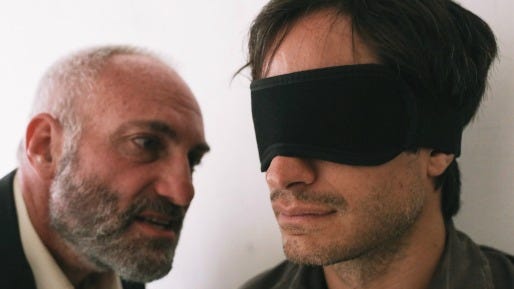Rosewater

I'm not sure if "Rosewater" would have received all the intention it's getting if not for the presence of writer/director Jon Stewart, the TV funnyman/self-declared oracle who wanted to take a crack at something more serious. Still, it's a good film — a bit overly earnest, but certainly worthy of our attention.
It's not surprising Stewart chose the plight of journalist Maziar Bahari as his subject. The Canadian-Iranian was arrested by the Iranian regime in 2009 following an appearance on a segment for Stewart's "The Daily Show" in which the interviewer jokingly referred to Bahari as a Western spy. The Muslim fundamentalists who run the government, who aren't big on subtleties, arrested him and kept him in solitary confinement for nearly four months, where he was submitted to emotional and physical torture.
The film, based on a book by Bahari, takes a long time getting to its heart, which is Bahari (played by Gael García Bernal) trapped in a room with his "specialist," aka interrogator. The first 30 minutes or so show him wandering around Tehran covering the Iranian presidential elections, videotaping the sometimes-violent demonstrations, and visiting with his mother (Shohreh Aghdashloo).
This section is supposed to establish Bahari's bona fides as a gentle free thinker who just wants to bear witness to the historical events taking place. But it slows down the proceedings greatly and saps them of emotional strength.
Once captured, though, the movie takes off even as the story stays more or less locked in a single room. Bahari is kept blindfolded almost all the time, facing a wall, while his specialist tries to elicit a confession out of him. Over the weeks and months that follow, he learns little about the man other than he uses rosewater as a cologne.
Trapped the rest of the time in a lonely cell, the man's mind begins to wander — thinking of his pregnant wife, his father (Haluk Bilginer), who was himself kept a prisoner during the days of the Shah, and his sister (Golshifteh Farahani), who suffered a similar fate for being a Communist in the 1980s.
The conversations with his imagined father were the most interesting to me, as Bahari falls further into despair and considers giving up and signing the confession. In a demonstration of old-school manliness, his father's spirit urges him to "give them nothing" and resist the beatings, and walk out of prison with his head held high — even if it takes years.
Eventually, Bahari finds a way to overcome his captors using his imagination and willpower. It's the triumph of the beta male.
The performances are generally solid, especially Kim Bodnia as "Rosewater," Bahari's chief interrogator. Bodnia portrays him as a man who knows he has an awful job, but tries to make the best of it as he can. Over time he forms a bond with his prisoner that is surprising to him, especially when his superior orders him to deliver an arbitrary beating.
"Rosewater" isn't a great drama, but it's a pretty good one. Whatever else you want to say, Jon Stewart has a future in movies if ever gets tired of being incredibly rich and successful on television.
4 Yaps



